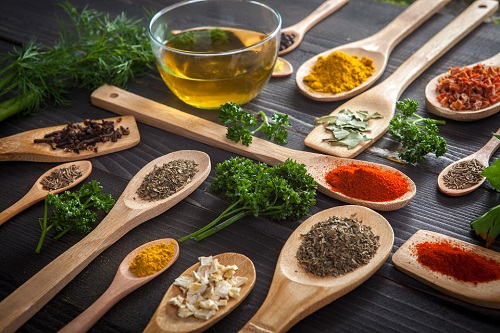Adding Flavor to Foods

Flavor: More than Salt
There are so many great ways to add flavor to food: sauces, seasonings, marinades and herbs. Another common way to flavor food is by adding salt. Restaurants and food companies often add salt as a main source of flavor for their foods. Regular table salt contains sodium and for those with chronic kidney disease (CKD), too much sodium can be harmful to the body. When you have CKD, you may need to follow a low-sodium diet. Following a low-sodium diet may help you better control your blood pressure. This can be especially challenging when so many pre-made sauces and marinades contain higher amounts of sodium. Homemade sauces and marinades, low-sodium seasonings, and fresh citrus and herbs can be great alternatives to flavor your food.
Low-Sodium Seasonings and Spices
Many seasonings like garlic salt and seasoning blends, often contain salt. If you are limiting your sodium intake, you may try opting for seasonings without salt in them. Some common seasoning blends without added salt are Mrs. Dash®, Lawry’s® salt-free seasonings, Spiceology and Magic Seasoning Blends®. These no-sodium seasonings contain herbs and spices to give your food a punch of flavor, without the salt! Spices like ginger, cinnamon, turmeric and garlic are tasty alternatives to salt-packed seasonings. For example, adding ginger and garlic to your stir-fry or meat adds delicious flavors that can liven up your dish. Many of these spices also have beneficial compounds called antioxidants that can help manage and prevent disease.
Sauces and Marinades
Sauces and marinades are great for adding flavor to food. However, store-bought sauces like tomato sauce and BBQ sauce can be high in sodium. If you are following a low-sodium diet, be sure to read the nutrition label for sodium content. Many stores carry “lower-sodium” sauce options, including those made by Hunts®, Prego®, and Victoria®. Another great option for adding flavor to your food is to make your own sauces and marinades. This way, you know exactly what is going into your food! Using fresh lemon, lime or orange juice can help add flavor to your sauces and marinades, without the added salt. Adding oils and vinegars infused with herbs or flavors, like truffle oil, apple cider vinegar or balsamic vinegar is also a good way to add flavor to your food.
Salt Substitutes
Use caution when it comes to salt substitutes. Many salt substitutes on the grocery shelves contain potassium chloride, a very high-potassium ingredient. Although potassium is a nutrient that is necessary to help the heart and muscles function properly, too much potassium can be harmful to the body. For those with CKD, potassium control is especially important. When kidney disease is present, especially in advanced kidney failure, the kidneys are unable to filter out potassium adequately and potassium can become elevated in the blood. High potassium can also occur from eating too many high-potassium foods or taking medications or supplements high in potassium. Check with your doctor if you have questions about your medications or supplements. Check with your renal dietitian or doctor if you have further questions about the appropriate potassium level for you.
Herbs
Herbs can be used to add flavor to salads, sauces, dressings, marinades, chicken, fish and vegetables, without added salt. Adding basil to a mozzarella and tomato salad can add a pop of flavor you may not expect. Adding dill to seafood can help add flavor without adding excess salt. Cilantro and oregano can pair well with homemade salad dressings to add flavor to salads.
Some commonly available herbs are:
- Cilantro
- Dill
- Parsley
- Basil
- Mint
- Oregano
- Rosemary
- Thyme
- Sage
- Chives
Reading Labels for Sodium
Reading labels is important when you are on a sodium-restricted diet. Be sure to check out the nutrition facts label for the sodium content of packaged foods. Be mindful of serving sizes and portions that you eat. Many labels will list the amount of sodium in milligrams. The typical recommendation for a low-sodium diet is 2,000 milligrams per day. The recommendation for those with kidney disease may vary from 2,000 milligrams to 3,000 milligrams per day depending on blood pressure, urine output, and medical history. Be sure to check with your doctor or dietitian for your individualized nutrient needs.
Use the above tips and tricks for adding flavor to your food.
Homemade Seasonings and Sauces
Try these low-sodium recipes to help you stay on track with your sodium goal.
- Italian Dressing
- Homemade BBQ Sauce
- Roasted Red Pepper Tomato Sauce
- Mexican Seasoning
- Salt-Free Cajun Seasoning
- Easy Salt-Free Seasoning Dip
For more information on herbs and spices read “Spicin’ up Your Meals, One Dish at a Time”.
References
- https://health.clevelandclinic.org/are-salt-substitutes-a-healthy-way-to-lower-your-sodium-intake/#:~:text=%E2%80%9CHowever%2C%20salt%20substitutes%20can%20be%20dangerous%20when%20you,%28normally%20well-controlled%20by%20the%20body%29%20in%20your%20blood. Accessed January 29 2021.
- https://www.healthline.com/nutrition/salt-alternatives. Accessed January 29 2021.
- https://www.heart.org/en/healthy-living/healthy-eating/cooking-skills/preparing/how-to-add-flavor-using-herbs-and-spices-video. Accessed January 29 2021.
- https://www.foodnetwork.com/recipes/articles/guide-to-fresh-herbs. Accessed January 29 2021.
Additional Kidney Diet Resources
Visit DaVita.com and explore these diet and nutrition resources:
- DaVita Food Analyzer
- DaVita Dining Out Guides
- Today’s Kidney Diet Cookbooks
- DaVita Kidney-Friendly Recipes
- Diet and Nutrition Articles
- Diet and Nutrition Videos
- Kidney Smart® Virtual Classes
This article is for informational purposes only and is not a substitute for medical advice or treatment. Consult your physician and dietitian regarding your specific diagnosis, treatment, diet and health questions.
Brand names have been included in this material for educational purposes only. DaVita does not endorse one brand over another. There are other brands in addition to these that could be equivalent.

Recent Comments